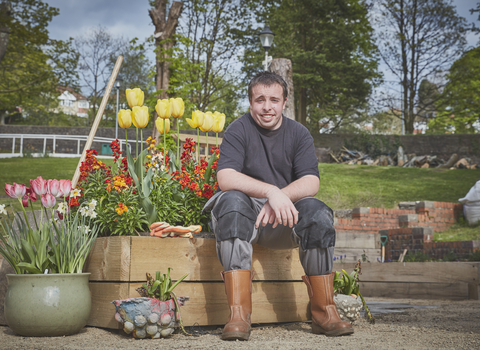How businesses can help you
Get started
Local groups, voluntary organisations and small charities can all work together with businesses.
How businesses can support you - Community Hub (https://www.youtube.com/watch?v=wzH-0mv9rU0)
Isla from Newark explains what businesses can do for you, and what you can do for them. Copyright The Wildlife Trusts.
Building a partnership with a local business
You can ask a business for money to help you with an event or project. This will usually be called “sponsorship.” You can ask for ongoing help over time. This might be called a “charity partnership”.
The business might be called a “corporate supporter”, “funding partner” or “commercial participator.” The charity or group will be called the “charity partner.”
You should have a Commercial Participation Agreement if a business is raising money for you through sales, as they are “fundraising” for you. See Work For Good here for an easy version (but be aware they are trying to get you to sign up – you don’t need to). The official guidance is here and more here. (Note the legal obligation does NOT apply to Northern Ireland).
Local businesses helped residents in Bemerton, Wiltshire build raised beds and a wooden gazebo for their community garden. Copyright Zosia Durniat Wiltshire Wildlife Trust
What sort of businesses should we ask?
All companies have the potential to support you, large or small, national or local. Don’t be worried about approaching larger national or international companies with local offices.
They still have a local connection to your area and will employ lots of local people. Think about big businesses like these:
- Food brands such as Greggs, Muller, Heinz, Pepsico
- Big industry like car manufacturers
- IT and software such as Sage, DXC and more.
Smaller companies, or small branches of large companies, can be easier to form a relationship with, but may not be able to offer monetary support. But think about other forms of support - a tech company can help with training or equipment, for example.
How do we find them?
Look at a map – what’s in your area? Looking for businesses, whether large or small, around your area is a great starting point for research and helps to build a list of potential companies to approach. If they are very local to you, you might have connections already through friends or your own employment. Ask in your group. Someone might know or be related to someone in a local business.
You can meet businesses at local networking events. See your Chamber of Commerce (it is easiest to google “chamber of commerce” and your town name). Also look for Business over Breakfast clubs.
Look at who is advertising in local press and free magazines, and simply keep your eyes open as you go around – have a walk around an industrial estate or local enterprise zone and you’ll be surprised at what companies are there that you didn’t know existed.
The National Business Response Network came out of the Covid-19 pandemic. They join businesses with community groups who need support. They say: “All organisations focused on making a positive difference in the community are eligible. Whether you are a non-profit, charity, community, or voluntary organisation, register your interest, and a team member will work with you to see how we can support your needs.” It’s part of The Business in the Community organisation/The Prince’s Responsible Business Network.
Also look at Neighbourly which is a digital platform that connects businesses with local organisations. They say, “We help businesses make a positive impact in their communities by donating volunteer time, money and surplus products to local causes, all in one place.” If you are not a registered charity or CIC, you can still ask for help that isn’t money – you can ask for volunteer time, surplus products or advice.
What do we ask for?
Business support doesn’t have to be monetary. You could ask for training, work experience, a space to meet, or the donations of items. This could be tools, tech equipment or more.
Businesses can encourage employees to fundraise through events and charities and this is particularly effective when the employees have been consulted about which local group to support, or they have a personal connection.
What can we offer them?
You need to persuade them how you can be good for them. You could say:
- A partnership builds “brand awareness” because you can put them on your website and flyers. If they sponsor a planter you can put their name on it!
- It can open more networking opportunities for them at charity events.
Put as many specific examples as you can together. And practice talking about it out loud, so you are ready when they ask you.
Remember to tell them what your group does, and share emotional stories with them so that they understand how important your work is. Make it real for them.
How do we ask?
Do your research first, by looking at their website and on LinkedIn. On their website, look at their “About us” or “Meet the Team” section – often this is in the small footer bit at the bottom.
The person you need to speak to can vary. In a big company there can be a “relationship manager” or “corporate social responsibility manager.” In a medium company, you could speak to someone in marketing, communications or PR (Public Relations). If the company is very small, you could contact one of the partners or bosses.
It’s great if you can speak to someone first at an event, but if you can’t, then send an email. Keep it quite short but include all the main points about what you can offer them, and why your group is so important. Ask if they would like to meet up for a coffee and a chat, or have a video call or phone call. If you don’t get a reply, you can follow up a week or two later.
If you have practised talking about your group, you will find it easier. Practice on a friend, family member, or stuffed toy!
Focus on how you can support them and talk about the clear link between your group and the business’s aims or values.


The Wildlife Trusts
Have you been part of a community nature project?
We'd love to hear from you! Your experiences will be shared right here on the Community Hub and will inspire others to take action in their own neighbourhoods.


CC by 4.0 attribution
Except where noted and excluding images, company and organisation logos, this work is shared under a Creative Commons Attribution 4.0 (CC BY 4.0) Licence.
Please attribute as: “Nextdoor Nature (2022-2024) by The Wildlife Trusts funded by The National Lottery Heritage Fund, licensed under CC BY 40”

